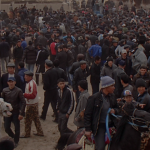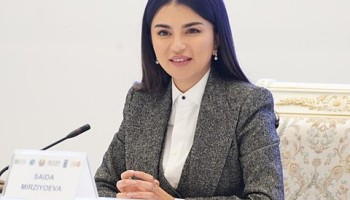She was a president's daughter, a virtual princess, who married a successful businessman and went to Harvard but she ended up a hated woman prosecuted by her own father's government.
They met at a party at her parents’ home, then dated for six months. They celebrated two weddings: a religious ceremony in Uzbekistan in November 1991, and a civil ceremony in New York City in December 1991. The bride was just 19.
Over the next 10 years, Gulnara Karimova and Mansur Maqsudi, a naturalized American businessman of Afghan origin, lived in New Jersey, travelled back and forth to Uzbekistan for his business and her family, bought and sold homes, visited country clubs, raised a little boy and a girl, and pursued graduate degrees at Harvard University.
But on July 28, 2001, after a huge argument that involved her two bodyguards, he told her he was done with the marriage. She left for Tashkent the next day with the children.
Things did not turn out well for him after that.
He has become the subject of an international arrest warrant. He lost his business in Uzbekistan. His relatives have been sentenced to years in prison. And though he won a custody battle in an American court, she has made sure he cannot see his children.
His wife was no one to cross. Karimova turned out to be a vindictive woman with no restraints.
With her father’s support, she seems to have been able not only to make her ex -- and anyone else at odds with her -- suffer, but also to build an exciting new life. For much of the past 14 years, she thrived in a series of glamorous jobs as a fashion designer, a pop starlet, a diplomat – and finally as a businesswoman in control of billions.
She was the unrepentant prodigal daughter who wrecked lives while she took in billions from selling her influence and spent lavishly on herself.
Now, at 42, she may be getting a taste of her own medicine. Over the past two years, relations with her father and other relatives have soured as they did with her husband. Authorities have shut down some of her enterprises, seized their bank accounts and property and a variety of governments are looking into possible bribery and money laundering charges.
Over the past year, the Organized Crime and Corruption Reporting Project (OCCRP) has looked into how Karimova’s money-making machine operated.
The answer, which OCCRP explains in these and future stories, rests with the dozens of proxies and offshore companies she set up to extract money from an array of sectors in the Uzbek economy.
She began with telecoms. In the end, she profited handsomely while the losers were the Uzbek people who are still paying for her deals with some of the world’s highest phone rates.
All things did not work out perfectly for Karimova. She was charged by her own father's government for organized crime, extortion and bribery. Whether she is ever found guilty, she will forever be seen as a poster child of power, greed and vindictiveness.







